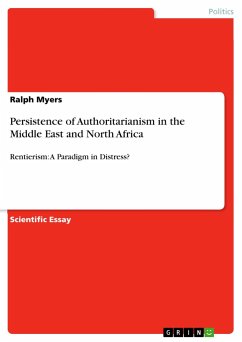In this dissertation I have examined the persistence of authoritarianism in the Arab World. Algeria, Morocco, Tunisia, Egypt, Jordan, and Yemen all embarked on substantial political reforms in the late 1980s. These political liberalization reforms coincided with a wave of democratization that swept over regimes in Eastern Europe, Latin America, and Africa. However, in the mid-1990s most of the Arab states were able to revoke the bulk of their liberalization reforms, thus frustrating what many observers had viewed as a promising step towards democracy. Unlike other parts of the world, the regimes return to authoritarianism in the Arab world faced unexpectedly little resistance from domestic civil society or from the international community. How is it that a regime can abandon liberalization political reforms and return to authoritarian rule, yet face negligible internal and external resistance?
Bitte wählen Sie Ihr Anliegen aus.
Rechnungen
Retourenschein anfordern
Bestellstatus
Storno








